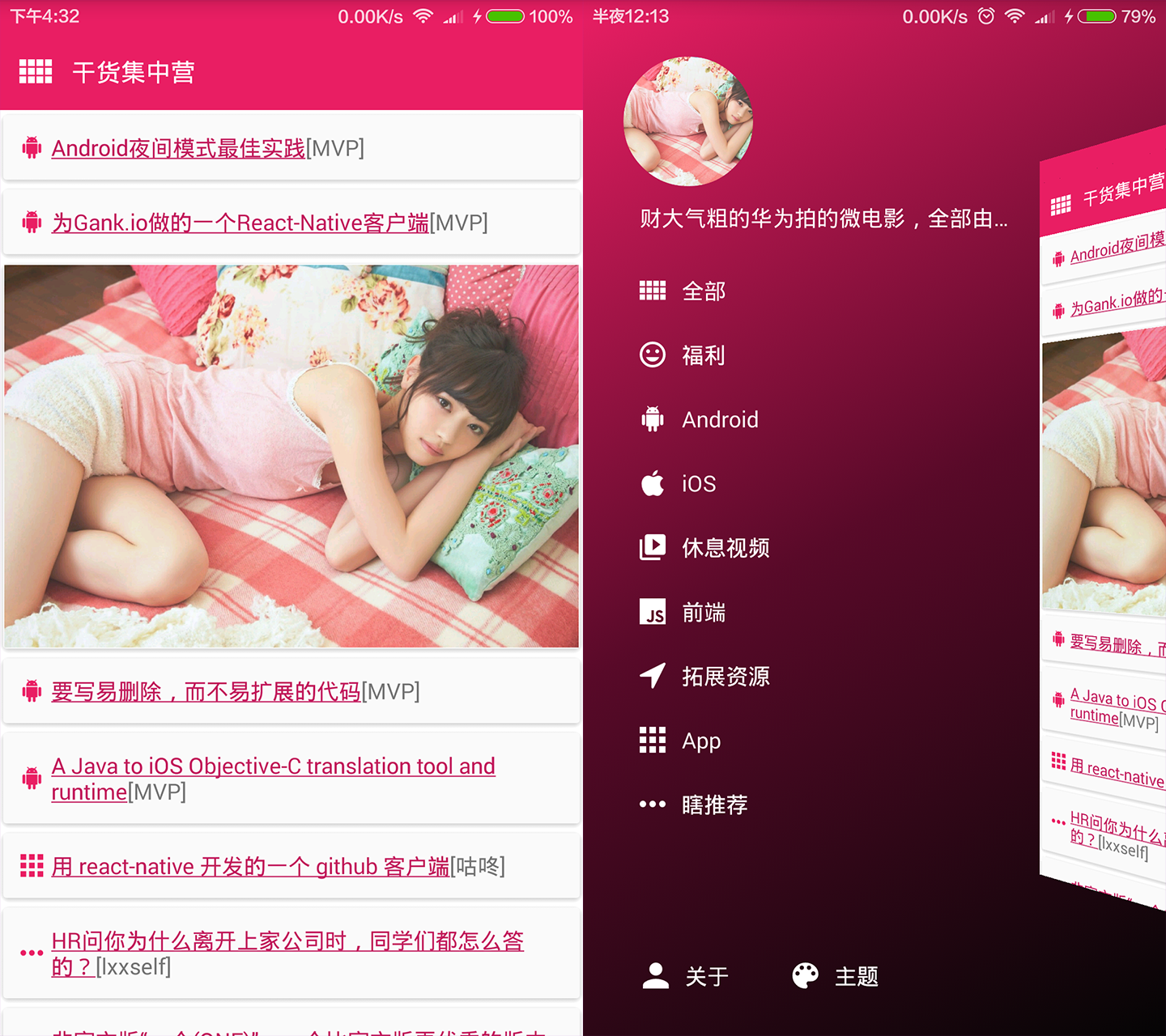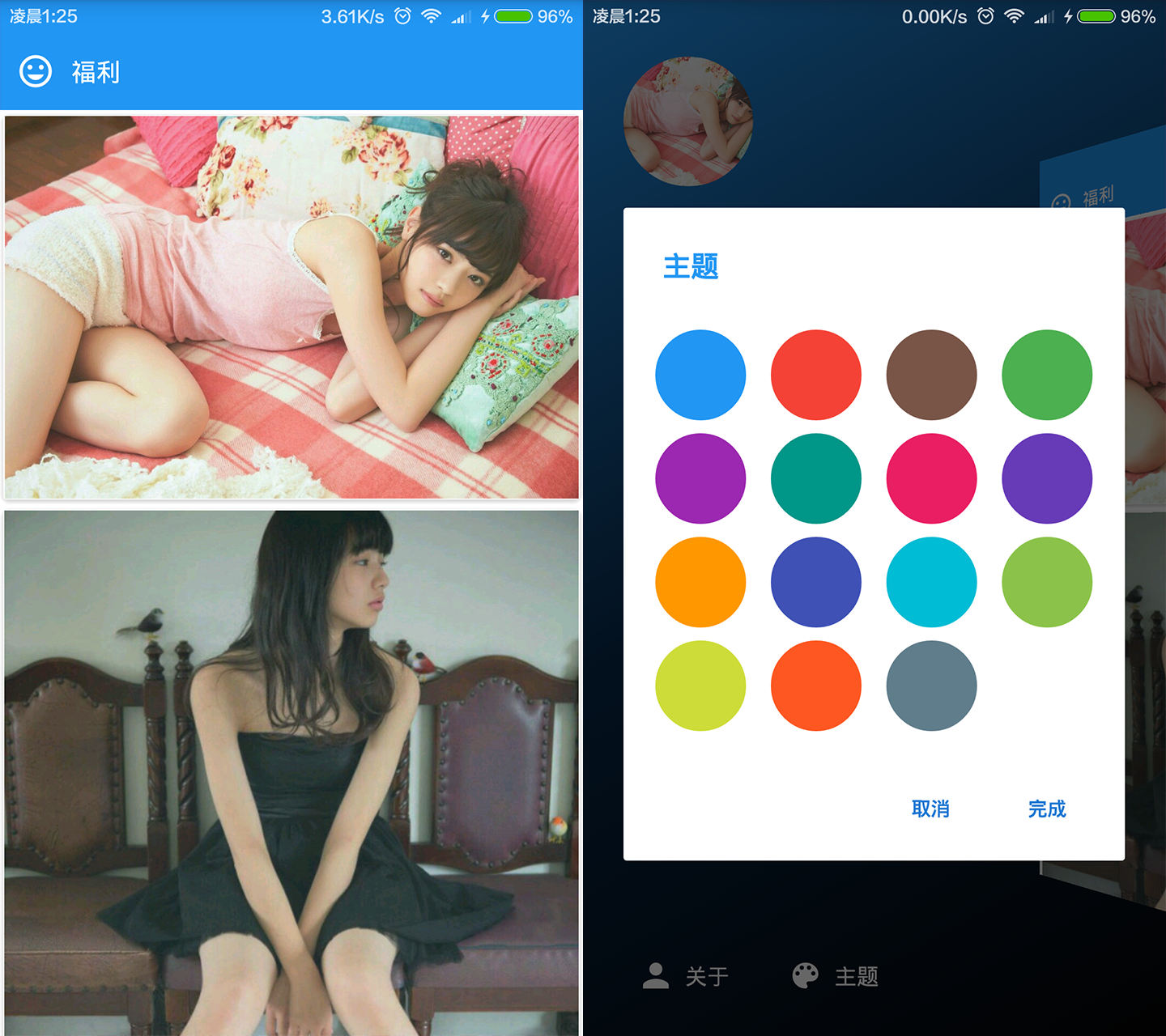Android 沉浸式状态栏、状态栏一体化、透明状态栏、仿iOS透明状态栏
http://blog.csdn.NET/jdsjlzx/article/details/50437779
注:状态栏的字体颜色位白色, 如果状态栏背景为白色,上面的博客已经解决了。
原文出处:http://niorgai.github.io/2016/03/20/Android-transulcent-status-bar/
最近业务上看到一个设计图挺好看,所以研究了一下透明状态栏,注意不是沉浸式状态栏,在参考了网上的一些资料后,整理出了这篇博客.
Github Demo 链接: StatusBarCompat
参考文章:由沉浸式状态栏引发的血案
Translucent System Bar 的最佳实践
该使用 fitsSystemWindows 了!
首先强调,对于状态栏的处理有两种不同的方式, 这里从Translucent System Bar 的最佳实践直接盗了两张图做对比~.
| 全屏( ContentView 可以进入状态栏) | 非全屏 ( ContentView 与状态栏分离, 状态栏直接着色) |
|---|
 |  |
先定义几个名词:
全屏模式: 左边图所示.
着色模式: 右边图所示.
ContentView: activity.findViewById(Window.ID_ANDROID_CONTENT) 获取的 View , 即 setContentView 方法所设置的 View的父布局,FrameLayout.
ContentParent: ContentView 的 parent , 实质为 LinearLayout.
ChildView: ContentView 的第一个子 View ,即布局文件中的 layout .
再介绍一下相关的函数:
fitsSystemWindows, 该属性可以设置是否为系统 View 预留出空间, 当设置为 true 时,会预留出状态栏的空间.
ContentView, 实质为 ContentFrameLayout, 但是重写了 dispatchFitSystemWindows 方法, 所以对其设置 fitsSystemWindows 无效.
ContentParent, 实质为 FitWindowsLinearLayout, 里面第一个 View 是 ViewStubCompat, 如果主题没有设置 title ,它就不会 inflate .第二个 View 就是 ContentView.
5.0以上的处理:
自5.0引入 Material Design ,状态栏对开发者更加直接,可以直接调用 setStatusBarColor 来设置状态栏的颜色.
全屏模式:
- Window window = activity.getWindow();
-
- window.addFlags(WindowManager.LayoutParams.FLAG_TRANSLUCENT_STATUS);
-
-
- window.addFlags(WindowManager.LayoutParams.FLAG_DRAWS_SYSTEM_BAR_BACKGROUNDS);
-
- window.setStatusBarColor(statusColor);
-
- ViewGroup mContentView = (ViewGroup) activity.findViewById(Window.ID_ANDROID_CONTENT);
- View mChildView = mContentView.getChildAt(0);
- if (mChildView != null) {
-
- ViewCompat.setFitsSystemWindows(mChildView, false);
- }
着色模式:
- Window window = activity.getWindow();
-
- window.clearFlags(WindowManager.LayoutParams.FLAG_TRANSLUCENT_STATUS);
-
-
- window.addFlags(WindowManager.LayoutParams.FLAG_DRAWS_SYSTEM_BAR_BACKGROUNDS);
-
- window.setStatusBarColor(statusColor);
-
- ViewGroup mContentView = (ViewGroup) activity.findViewById(Window.ID_ANDROID_CONTENT);
- View mChildView = mContentView.getChildAt(0);
- if (mChildView != null) {
-
- ViewCompat.setFitsSystemWindows(mChildView, true);
- }
4.4-5.0的处理:
4.4-5.0因为没有直接的 API 可以调用,需要自己兼容处理,网上的解决方法基本都是创建一下高度为状态栏的 View ,通过设置这个 View 的背景色来模拟状态栏. 这里我尝试了三种方法来兼容处理.
方法1: 向 ContentView 添加假 View , 设置 ChildView 的 marginTop 属性来模拟 fitsSystemWindows .
全屏模式:
- Window window = activity.getWindow();
- ViewGroup mContentView = (ViewGroup) activity.findViewById(Window.ID_ANDROID_CONTENT);
-
-
- View mChildView = mContentView.getChildAt(0);
- if (mChildView != null) {
- ViewCompat.setFitsSystemWindows(mChildView, false);
- }
-
- int statusBarHeight = getStatusBarHeight(activity);
-
- window.addFlags(WindowManager.LayoutParams.FLAG_TRANSLUCENT_STATUS);
-
- if (mChildView != null && mChildView.getLayoutParams() != null && mChildView.getLayoutParams().height == statusBarHeight) {
-
- mContentView.removeView(mChildView);
- mChildView = mContentView.getChildAt(0);
- }
- if (mChildView != null) {
- FrameLayout.LayoutParams lp = (FrameLayout.LayoutParams) mChildView.getLayoutParams();
-
- if (lp != null && lp.topMargin >= statusBarHeight) {
- lp.topMargin -= statusBarHeight;
- mChildView.setLayoutParams(lp);
- }
- }
着色模式:
- Window window = activity.getWindow();
- ViewGroup mContentView = (ViewGroup) activity.findViewById(Window.ID_ANDROID_CONTENT);
-
-
- window.addFlags(WindowManager.LayoutParams.FLAG_TRANSLUCENT_STATUS);
- int statusBarHeight = getStatusBarHeight(activity);
-
- View mChildView = mContentView.getChildAt(0);
- if (mChildView != null) {
- FrameLayout.LayoutParams lp = (FrameLayout.LayoutParams) mChildView.getLayoutParams();
-
- if (lp != null && lp.topMargin < statusBarHeight && lp.height != statusBarHeight) {
-
- ViewCompat.setFitsSystemWindows(mChildView, false);
- lp.topMargin += statusBarHeight;
- mChildView.setLayoutParams(lp);
- }
- }
-
- View statusBarView = mContentView.getChildAt(0);
- if (statusBarView != null && statusBarView.getLayoutParams() != null && statusBarView.getLayoutParams().height == statusBarHeight) {
-
- statusBarView.setBackgroundColor(statusColor);
- return;
- }
- statusBarView = new View(activity);
- ViewGroup.LayoutParams lp = new ViewGroup.LayoutParams(ViewGroup.LayoutParams.MATCH_PARENT, statusBarHeight);
- statusBarView.setBackgroundColor(statusColor);
-
- mContentView.addView(statusBarView, 0, lp);
方法2: 向 ContentParent 添加假 View ,设置 ContentView 和 ChildView 的 fitsSystemWindows.
全屏模式:
- Window window = activity.getWindow();
- window.addFlags(WindowManager.LayoutParams.FLAG_TRANSLUCENT_STATUS);
-
- ViewGroup mContentView = (ViewGroup) activity.findViewById(Window.ID_ANDROID_CONTENT);
- ViewGroup mContentParent = (ViewGroup) mContentView.getParent();
-
- View statusBarView = mContentParent.getChildAt(0);
- if (statusBarView != null && statusBarView.getLayoutParams() != null && statusBarView.getLayoutParams().height == getStatusBarHeight(activity)) {
-
- mContentParent.removeView(statusBarView);
- }
-
- if (mContentParent.getChildAt(0) != null) {
- ViewCompat.setFitsSystemWindows(mContentParent.getChildAt(0), false);
- }
-
-
- View mChildView = mContentView.getChildAt(0);
- if (mChildView != null) {
- ViewCompat.setFitsSystemWindows(mChildView, false);
- }
着色模式(会有一条黑线,无法解决):
- Window window = activity.getWindow();
- window.addFlags(WindowManager.LayoutParams.FLAG_TRANSLUCENT_STATUS);
-
- ViewGroup mContentView = (ViewGroup) activity.findViewById(Window.ID_ANDROID_CONTENT);
- ViewGroup mContentParent = (ViewGroup) mContentView.getParent();
-
- View statusBarView = mContentParent.getChildAt(0);
- if (statusBarView != null && statusBarView.getLayoutParams() != null && statusBarView.getLayoutParams().height == getStatusBarHeight(activity)) {
-
- statusBarView.setBackgroundColor(statusColor);
- return;
- }
-
-
- statusBarView = new View(activity);
- ViewGroup.LayoutParams lp = new ViewGroup.LayoutParams(ViewGroup.LayoutParams.MATCH_PARENT,
- getStatusBarHeight(activity));
- statusBarView.setBackgroundColor(statusColor);
- mContentParent.addView(statusBarView, 0, lp);
-
-
- View mChildView = mContentView.getChildAt(0);
- if (mChildView != null) {
- ViewCompat.setFitsSystemWindows(mChildView, false);
- }
方法3:向 ContentView 添加假 View , 设置 ChildView 的 fitsSystemWindows.
全屏模式:
- Window window = activity.getWindow();
- window.addFlags(WindowManager.LayoutParams.FLAG_TRANSLUCENT_STATUS);
-
- ViewGroup mContentView = (ViewGroup) activity.findViewById(Window.ID_ANDROID_CONTENT);
- View statusBarView = mContentView.getChildAt(0);
-
- if (statusBarView != null && statusBarView.getLayoutParams() != null && statusBarView.getLayoutParams().height == getStatusBarHeight(activity)) {
- mContentView.removeView(statusBarView);
- }
-
- if (mContentView.getChildAt(0) != null) {
- ViewCompat.setFitsSystemWindows(mContentView.getChildAt(0), false);
- }
着色模式:
- Window window = activity.getWindow();
- window.addFlags(WindowManager.LayoutParams.FLAG_TRANSLUCENT_STATUS);
-
- ViewGroup mContentView = (ViewGroup) activity.findViewById(Window.ID_ANDROID_CONTENT);
- int statusBarHeight = getStatusBarHeight(activity);
-
- View mTopView = mContentView.getChildAt(0);
- if (mTopView != null && mTopView.getLayoutParams() != null && mTopView.getLayoutParams().height == statusBarHeight) {
-
- mTopView.setBackgroundColor(statusColor);
- return;
- }
-
- if (mTopView != null) {
- ViewCompat.setFitsSystemWindows(mTopView, true);
- }
-
-
- mTopView = new View(activity);
- ViewGroup.LayoutParams lp = new ViewGroup.LayoutParams(ViewGroup.LayoutParams.MATCH_PARENT, statusBarHeight);
- mTopView.setBackgroundColor(statusColor);
- mContentView.addView(mTopView, 0, lp);
其实全屏模式在三种模式下实现都是一样的,主要是着色模式实现不同.
对比一下三种着色模式实现的方式:
| | 方法1 | 方法2 | 方法3 |
|---|
| 原理 | 向 ContentView 中添加假 View, 然后利用 ChildView 的 marginTop 属性来模拟 fitsSystemWindows ,主要是通过修改 marginTop 的值可以在全屏模式和着色模式之间切换. | 因为 ParentView 的实质是一个 LinearLayout , 可以再其顶部添加 View . | 向 ContentView 中添加假 View, 然后利用ChildView 的 fitsSystemWindows 属性来控制位置, 但是实现缺陷就是不能随时切换两种模式. |
| 缺陷 | 改变了 ChildView 的 marginTop 值 | 着色模式下,会像由沉浸式状态栏引发的血案中一样出现一条黑线 | 不能在不重启 Activity 的情况下切换模式. |
| 对应 Github demo 中代码 | StatusBarCompat类 | StatusBarCompat1类 | StatusBarCompat2 类 |
总结
StatusBarCompat2 主要问题不能切换.
StatusBarCompat1 在4.4上会有一条黑线, 如果可以解决我觉得这是最靠谱的解决方法.
StatusBarCompat 类算是我最后给出的解决方案吧, 目前使用效果比较完善.推荐使用
推荐干货集中营Android客户端,实现了沉浸式状态栏,无缝换肤,带3D感觉的侧滑菜单
主页及侧滑页截图

gank1.png
福利及换肤截图

gank2.png
下载地址:干货集中营
github:GanK









